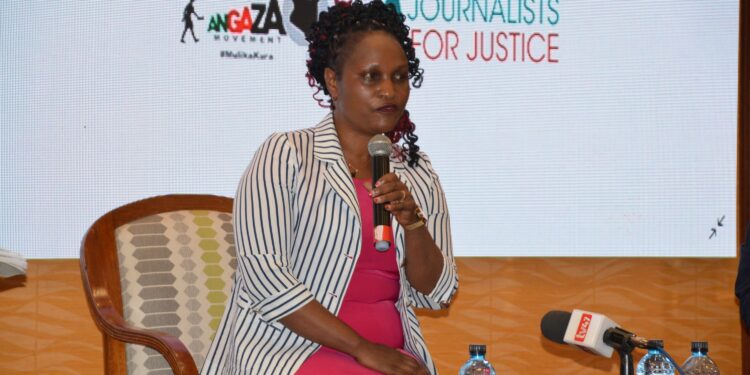There is continuing concern among civil society groups and human rights defenders in Kenya about the state of preparedness of key institutions as the August 9, 2022 elections approach.
They have raised questions on whether the duty-bearers, including the Independent Electoral and Boundaries Commission (IEBC), and the Ministry of Interior and Coordination of National Government, as well as civil society organisations and the media are prepared to effectively play their role to ensure peaceful, free, fair, and verifiable elections.
The role of technology in the poll processes featured prominently at a conference organised by Journalists For Justice (JFJ) and The Angaza Movement, with several speakers expressing concern about the technology to be used in the polls and whether the electoral management body had the necessary structures and systems in place.
Technology has in the past played a significant, if controversial, role in the administration of elections in Kenya. The past two electoral cycles (2013 and 2017) were plagued by widespread failure of the electronic voter identity and transmission systems, severely damaging confidence in the final results of the voting and sparking violence.
Fiona Asonga, Chief Executive Officer of Technology Service Providers of Kenya, said it was a matter of concern that the IEBC has not yet announced the details of the electoral systems it intends to deploy, yet the elections are less than three months away.
She added that once it is clear what technology system IEBC wants to use, the industry is ready to reach out to different groups in the community to raise awareness on how the system works.
“As an industry, we shall support IEBC and we will help you as civil society on what to expect on the technology,” said Asonga
Some participants accused the IEBC of failing to clarify the steps it has taken to address gaps in the technical and voting processes.
“The use of technology in Kenya hasn’t guaranteed credibility of elections. Instead, electoral technology has become the new frontier for electoral fraud,” said Winnie Masai, Director at Inform Action.
She urged the IEBC to guarantee the credibility and reliability of voting systems at the polling station by deploying technologies designed to produce free and fair election outcomes, as required by the law.
“We also need to encourage voter tallying as an alternative way of verifying election processes and enhance data protection,” she added.
The conference, held in Nairobi on May 17, 2022, was part of the Are We Ready campaign on electoral preparedness as Kenya entered the countdown to 100 days to the elections. Representatives of IEBC and the Ministry of Interior did not attend, although they had been invited.
Ethics and integrity were a topic of interest. Betty Okero, Team Leader at CSO Network, Kenya, asked duty-bearers to do their job of holding leaders accountable.
“Chapter six of the Constitution is very clear on the calibre of leadership the country should have,” said Masai.
The Ethics and Anti-Corruption Commission (EACC), through Head of Corporate Communications Eric Ngumbi, told JFJ that although there is increasing public and stakeholder clamour for effective enforcement of Chapter Six to ensure that persons elected to public office meet the integrity threshold, the organisation is hampered in its efforts to enforce the law.
He said the obstacles to the work of the agency as including lack of a clear statutory framework to operationalise the integrity threshold for election to state office, politicisation and ethnicisation of the enforcement of ethics laws, and apathy among the citizens.
The organistion said that although the effective implementation of Chapter Six on ethics and accountability is a collective responsibility that enjoins all actors, including state agencies, to discharge their respective duties, the ultimate integrity vetting decision lies with the citizens, who elect the leaders.
“They must be active participants in governance, and not spectators. Citizens, as the primary holders of sovereign power, must take charge of their political destiny and only elect into office persons who meet integrity requirements,” said Ngumbi, adding that the media, civil society, and religious organisations have an important role to proactively demystify integrity as a vital consideration in making voting decisions.
Registrar of Political Parties Ann Nderitu lauded Kenyans for their growing awareness of their rights, saying more than two million people resigned from political parties that had registered them without their consent.
She explained that her office was streamlining the management of political parties and that this would herald better organisation of the elections.
Conference participants said they expect the media to play a prominent role in enhancing democracy in the elections. At the national level, the Kenya Editors Guild and the Media Council of Kenya were expected to manage the presidential debate, unlike in the past, when it was run by media owners, whose main concern was commercial gain.
Community media is playing an important role in enlightening citizens about their prospective leaders, interviewing regional aspirants on local radio and TV stations.
According to Association of Media Women in Kenya Executive Director Judy Kaberia, the Kenya Media Sector Working Group is offering election reporting training to journalists.
There was also concern about insecurity in several parts of the country. Participants asked how voting will be conducted in areas that have suffered violence, including Laikipia and Baringo, leading to the displacement of residents and closure of schools, which are used as polling stations.







